If you’ve ever planted a garden, you know how exciting it is to see your vegetables grow, especially colorful ones like radishes. These peppery root vegetables are not just for Asian or Japanese cuisines, they can also be a nutritious addition for your backyard birds.
Chickens love the zesty flavors of radishes, and the best part? They’re edible from top to bottom. Whether you choose to prepare them raw, cooked, or just toss the leaves to your flock, your chooks will happily forage and enjoy.
It’s crucial to understand how to safely feed radishes. Their nutrients can help improve your chicken’s immune system and overall health, making them a great treat.
While you’re letting your birds go wild in the garden, make sure to monitor their intake and avoid overfeeding. The fact is, these plants can be a wonderful addition to their diet. By offering radishes as part of a healthy, balanced meal, you’ll see the benefits in their energy and well-being.
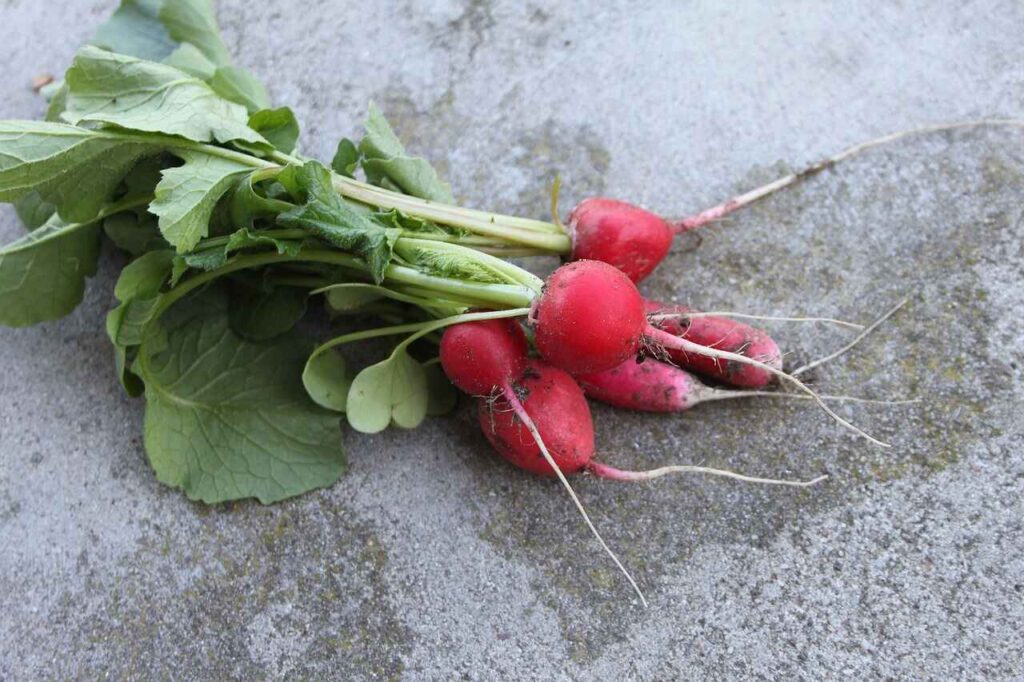
Table of Contents
ToggleCan Chickens Eat Radishes?
Yes! Chickens can safely eat all parts of the radish plant, including the greens, seeds, sprouts, stems, microgreens, and even wild or winter radishes. Radish greens are nutritious and a favorite snack, while seeds, seed pods, sprouts, and stems are also edible but less preferred.
Wild radish is safe when young, and winter radishes like Daikon and black radish can be fed raw or cooked. While raw radish is hard to eat, cutting it into smaller pieces helps, and cooking makes it even easier to digest.
Chicks should wait until three weeks old before eating radishes. Chickens enjoy radishes but may prefer softer foods, so feed them in moderation to prevent digestive issues. Avoid giving them onion, garlic, or other allium plants, as these may affect egg flavor. Overall, radishes are a healthy treat that provides essential nutrients while allowing chickens to enjoy foraging.
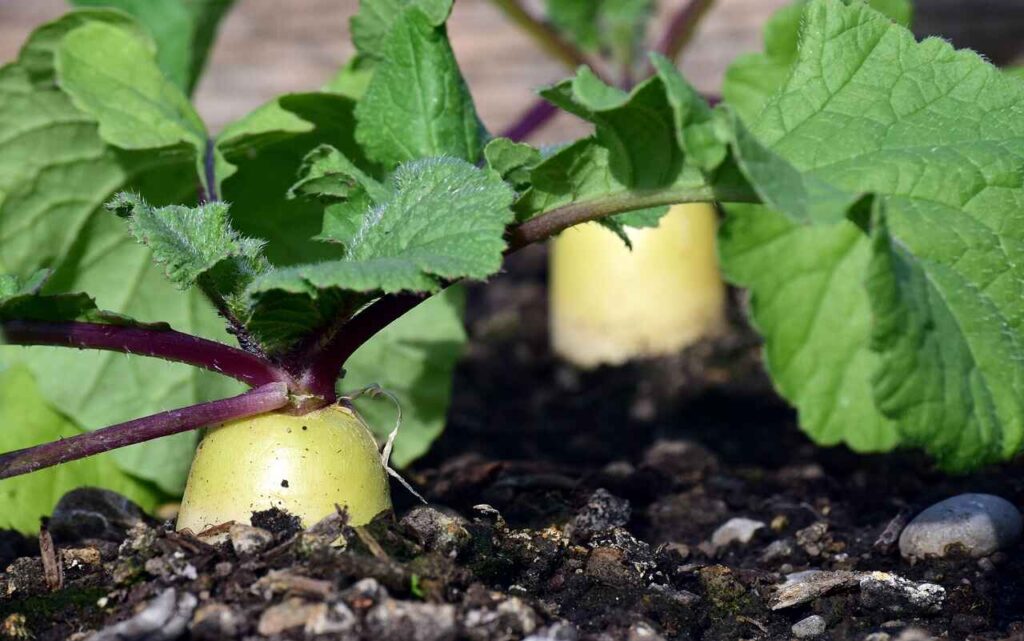
Do Chickens Eat Radish Greens?
Yes, chickens can eat radish greens, and they are perfectly safe and healthy for them. The greens are packed with nutrients, whether served raw or cooked, and chickens love picking at the leaves.
At my home, Hawk’s Haven, our chickens roam free-range in the garden and eagerly eat every part of the radish plant, including the tops. The sight of them enjoying these nutritious treats always makes me thank the decision to give them kitchen scraps, knowing they’re getting incredible benefits.
Just last week, after visiting a Mennonite farm stand, I brought home a bunch of cherry red and white radishes.
During a trip to the community park, I had a comical encounter with a playful puppy, but back at home, it was all about cleaning the muddy radishes and storing them in the fridge. The leftover radish greens were handed to the flock, who devoured them eagerly.
While you can let them snack on greens, avoid giving them onion, garlic, or other allium family plants, as they might affect the flavor of their eggs.
Can Chickens Eat Radish Seeds?
Yes, chickens can eat radish seeds and their green seed pods. While they might not be the most tasty option, they are a nutritious addition to your flock’s diet. If you want to plant radishes in your backyard, make sure to choose sandy, well-drained soil in sunny areas.
The peppery flavor of the seeds is also great for salads or even mixed with hummus and greens. Though not the top treats, they are still a good option for chickens, making them a valuable choice for anyone looking to offer a diverse diet.
Can Chickens Eat Radish Sprouts?
Yes, chickens can eat radish sprouts, which are immature plants that begin to germinate in water. While they’re perfectly safe, your flock will happily gorge on them and could destroy your garden before the plants can grow bigger.
If you’re growing radishes, it’s best to plan and keep the sprouts away from the chickens to protect their potential. Otherwise, they’ll surely find the sprouts in no time and finish them off quickly. Placing the sprouts out of reach is a simple way to ensure both your chickens and plants stay happy.
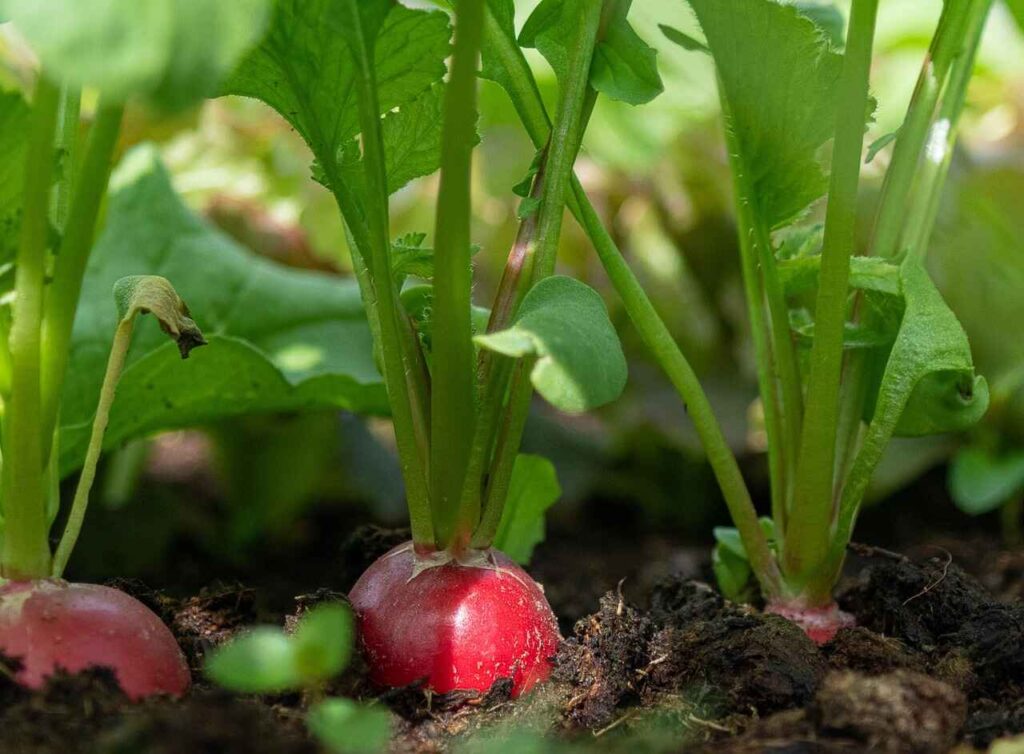
Can Chickens Eat Radish Stems?
Yes, chickens can eat the stems of the radish plant, as all its parts are edible. While radishes might not be their absolute favorite, mixing the stems with their feed is a great way to ensure they get the nutrients they need to maintain a healthy body.
Adding radish stems to their diet alongside other foods can help your chickens achieve better overall health, making it a simple but good choice for flock care.
Can Chickens Eat Radish Microgreens?
Yes, chickens can eat microgreens, which are the young version of full-grown radish leaves. These greens are edible and are harvested earlier, usually when they’re just a few inches tall. You can try feeding them to your flock by buying microgreens from the market or directly purchasing them from hydroponic farms. Adding these to their diet can provide extra nutrition for your chickens.
Can Chickens Eat Wild Radish?
Yes, chickens can eat wild radish, an earthy, broadleaf type of radish that grows anywhere, whether in summer or winter. Like its cultivated counterpart, all parts of the wild radish are edible, whether served raw or cooked, and they’re perfectly safe for your flock.
Thanks to its vitamin C, folic acid, and anthocyanin content, as well as its peppery taste, wild radish provides health benefits such as relieving sinus congestion, chest colds, sore throats, asthma, and hoarseness. Just be sure to pick the young ones, as they become bitter when they mature.
Can Chickens Eat Winter Radishes?
Yes, chickens can eat winter radishes, which mostly grow during the cold seasons. Popular types include Daikon, black radish, and watermelon radish, which taste similar to summer radishes with a mild to medium spicy flavor.
These radishes are best served raw for their crunchy texture, though you can also stir fry or grill them. They are perfectly safe and edible for chickens, even if some may taste slightly bitter, as this has no harmful effects. So, don’t worry if your flock decides to pick radishes in your backyard—it’s perfectly fine for them to enjoy all kinds and parts of radishes.
Can Chickens Eat Raw Radish?
Certainly, yes, chickens can eat raw radishes, including their leaves, stems, seeds, and roots, as all these parts are perfectly safe. However, make sure they don’t overfeed on radishes to avoid an upset stomach. While raw radishes are nutritious, they can be quite hard and difficult for chickens to eat, so they may struggle to make headway with them.
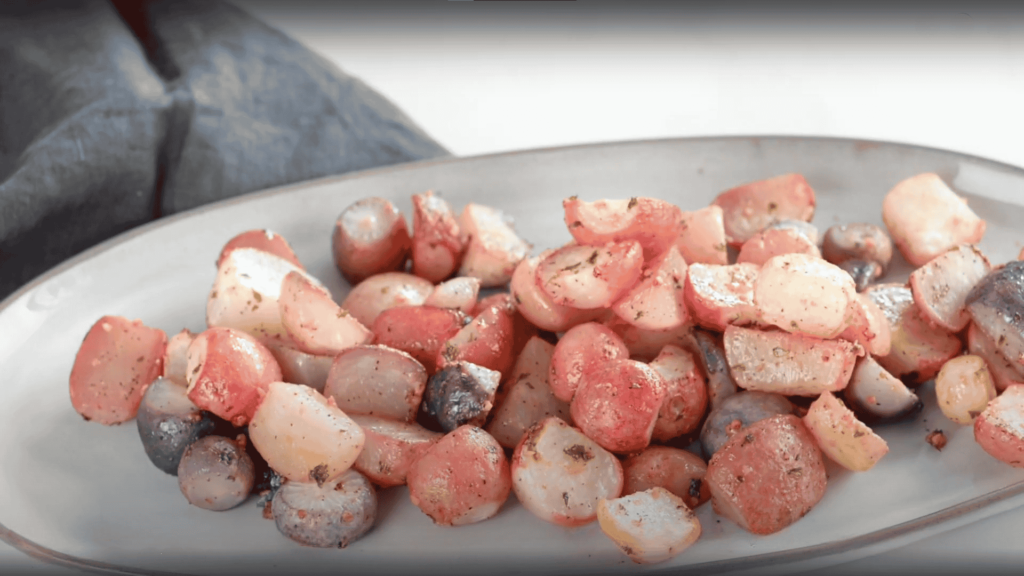
Can Chickens Eat Cooked Radish?
Undoubtedly, yes, chickens can eat cooked radishes, and it’s the best way to feed them to your chooks. Cooking the radish before serving makes it much easier for them to digest the food, ensuring your flock enjoys their meal comfortably.
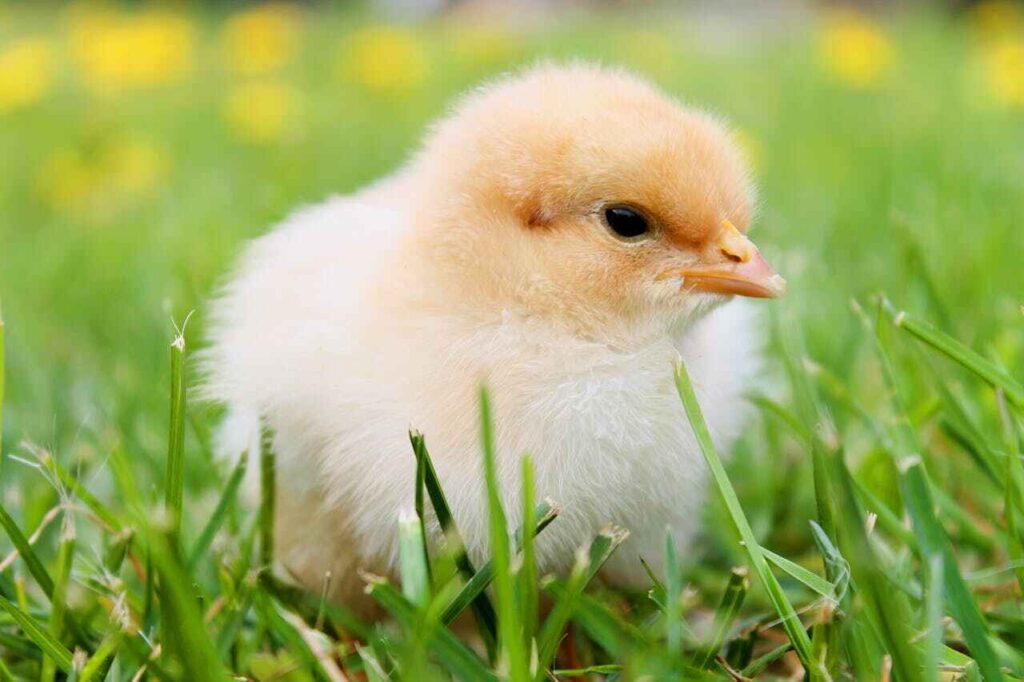
Can Chicks Eat Radish?
Newborn chicks cannot use their beak to pick food like radish because it’s too hard and difficult for them to digest, potentially causing harm to the young ones. However, when they’re ready to eat harder foods at about 3 weeks old, they’ll start picking at radishes. If you want to introduce this food to your little critters, make sure to slice it into small pieces to prevent choking.
Do Chickens Like Radishes?
When chickens go foraging, they often target root crops like radishes, which are among their favorite treats. Alongside sweet potatoes and carrots, radishes are one of the best crops to grow in your garden. Since all parts of radish plants are edible, chickens love picking at them and enjoy them as a nutritious snack.
Is Radish Healthy For Chickens?
Definitely, yes! Radish is a healthy, convenient, and easy crop to grow for your little critters. Your chooks can greatly benefit from feeding on radishes, as both the flesh and plants are nutritious and safe for them.
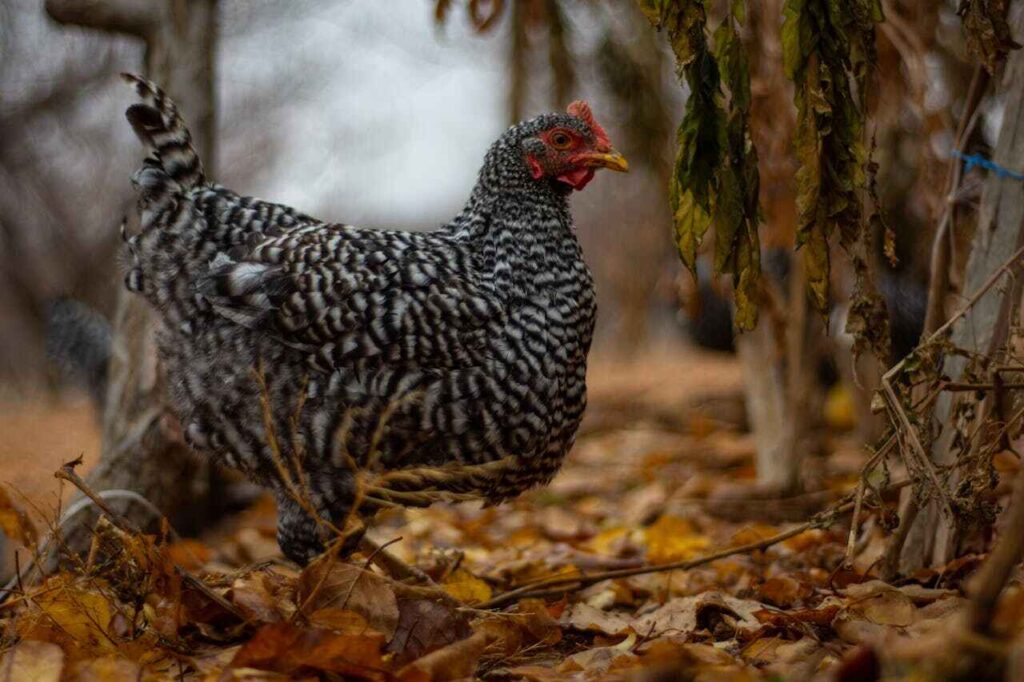
Benefits of Feeding Radishes
Adding radishes to your chickens’ diet can bring many health benefits. This veggie is packed with antioxidants that help repair damage caused by free radicals, while its anti-inflammatory properties reduce stressful conditions. High in fiber, radishes aid in digestion and bowel movement, keeping your flock healthy.
With essential nutrients like vitamin A, vitamin C, and calcium, radishes strengthen bones, egg shells, and the immune system, ensuring better egg production and overall vitality.
Radishes also help cooling your chickens during hot summer days by improving hydration due to their high water content. They are especially helpful in regulating temperature and preventing heat stress, which is vital for birds living in enclosed spaces.
The presence of anthocyanins, along with potassium, supports healthy blood vessels and boosts blood flow, minimizing the risk of diseases like oxidative stress.
To balance their diet, follow the 90/10 rule—90% of their food should come from specialized feed, while 10% can include treats like radishes, grapes, cherries, zucchini, cantaloupe, or even blackberries. This combination helps keep your chickens hydrated, happy, and strong. Include radishes alongside snacks like raisins, watermelon, and other foods to create an excellent mix for your flock.
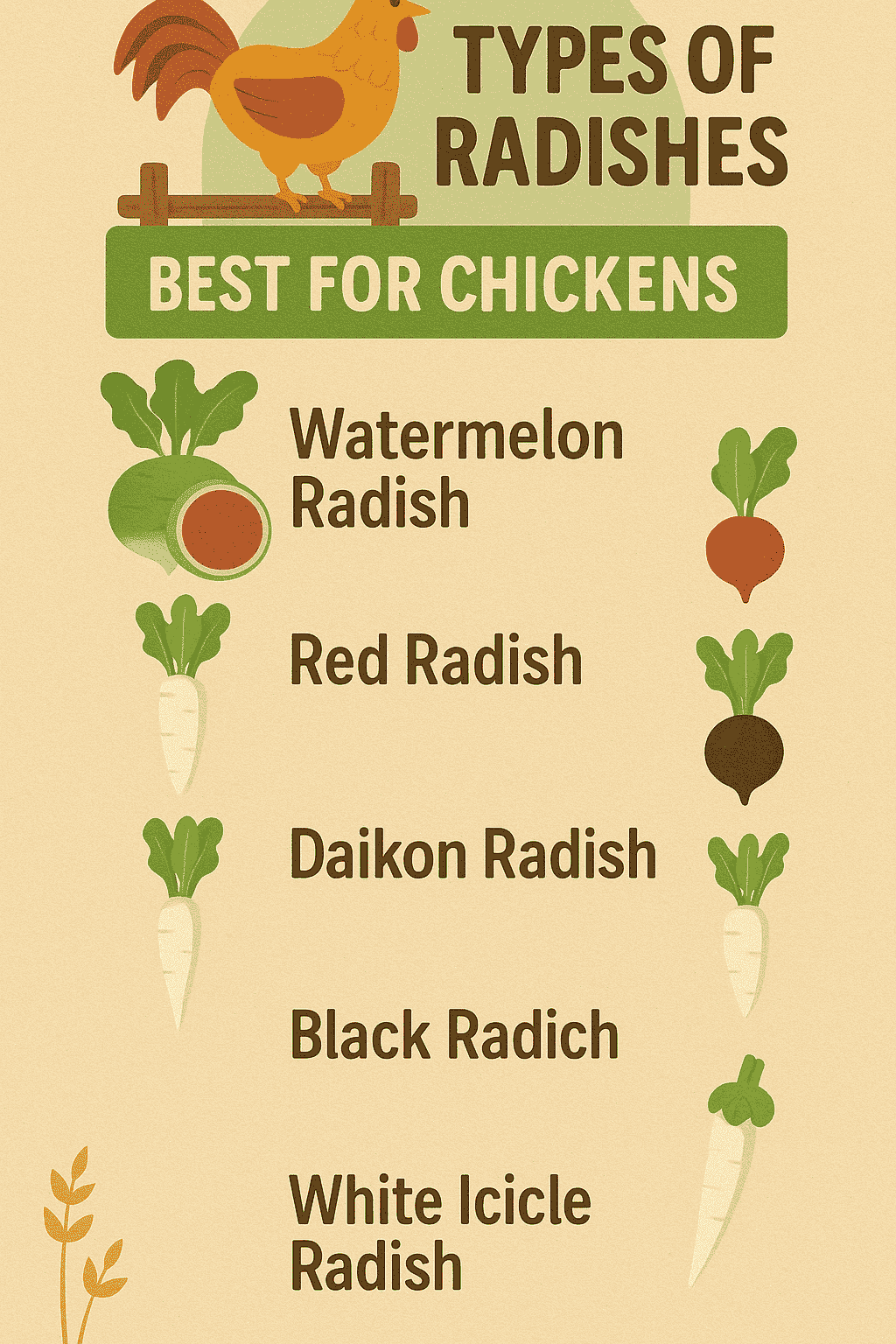
Types of Radishes Best for Chickens
Watermelon Radish
The watermelon radish is a pretty vegetable with green skin and pink flesh that resembles watermelons, though it doesn’t taste like them. This radish can be served raw or added to a salad for a colorful and refreshing touch.
Red Radish
The red radish is another pretty type of radish that is safe for chickens. As its name suggests, it features red skin and a juicy white flesh or interior. This popular variety is easy to find in any store.
Daikon Radish
The Daikon radish is a pale, cylindrical plant that stands out for its length and shape, resembling a carrot. Known as a Japanese radish, it is popular in traditional Japanese cuisines for its mild flavor, similar to a red radish. Daikon can be served pickled, dried, roasted, or even grated into soups, making it a versatile addition to any diet.
Black Radish
The black radish is unique with its black exterior and snowy white interior. It has an earthy, slightly bitter, spicy, and pungent flavor that is sharper than other varieties, especially when served raw.
White Icicle Radish
The White Icicle radish is a variety that looks similar to the Daikon radish due to its skin color and cylindrical shape. It features a rich, spicy flavor that is milder than red radishes and typically grows up to 12 to 20 cm.
How to Prepare Radish for Chickens
Preparing radishes as a treat for your chickens is easy, and here are some helpful tips. Slice or grate the radishes into smaller pieces to make them easier to eat, and chop the greens or leaves before feeding.
If the radish tastes too zingy when fresh, you can try cooked radishes instead. During the summer, soak the radishes to add hydration. At feeding time, simply chop the radish into pieces and mix them with their feeds. If you’re eating the bulbs yourself, give the leaves to your chicks—this way, nothing is wasted.
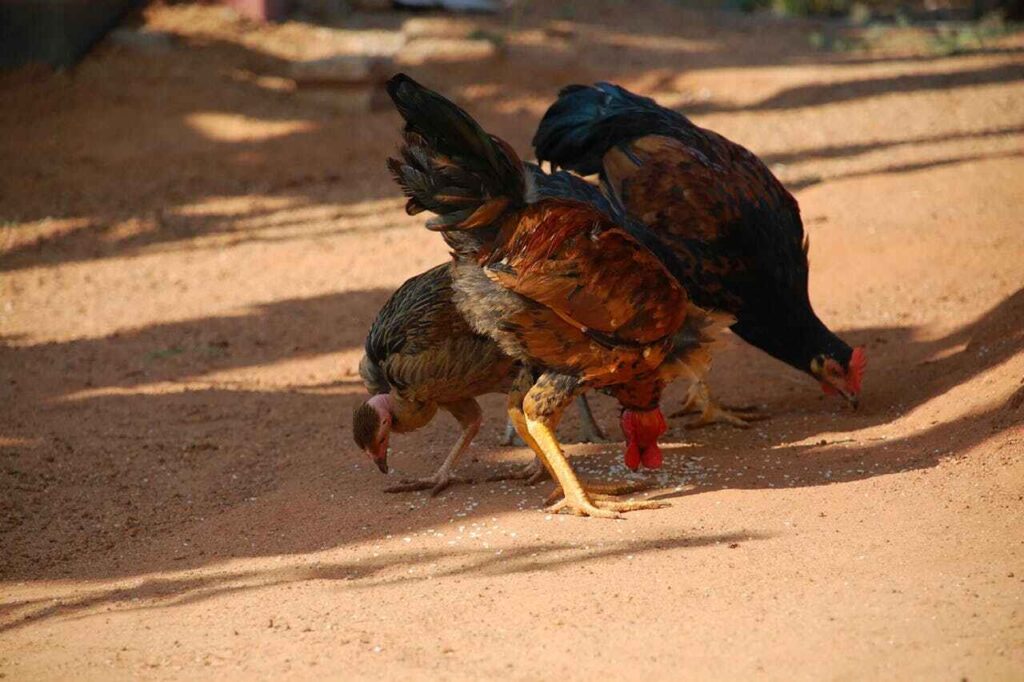
How to Feed Radishes to Chickens
Feeding radishes to chickens is simple, but it’s essential to do it the right way. For the first time, you should introduce radishes in moderation by mixing a small amount with their regular feed to avoid overfeeding.
Raw radishes can be too hard and have a strong flavor and odor, making them difficult for chickens to peck and digest. Cooking the radishes reduces their toughness and makes them softer and easier to eat. Once they’re prepared, chop them into bits and either mix them into the feed or sprinkle them on top.
If you want to make feeding fun, you can use radishes as a boredom buster or a chicken toy. Simply freeze radishes in a pan of water with other snacks like vegetables, and let the chickens peck away to stay entertained. A single, cooked radish is enough to feed about a half dozen birds. Always watch for any adverse effects, though it’s uncommon since radishes are safe to consume.
Things to Be Aware Of When Feeding Radish to Chickens
Before feeding radish to your chicken, there are a few things to check first to avoid any potential health risks. Taking these precautions ensures their safety and enjoyment of the treat.
Pesticides
Many products, including radishes, are intensively treated with pesticides during every growth stage, making it essential to wash them thoroughly before feeding them to your chooks. This simple step helps remove any residue and ensures the radishes are safe to consume.
Harmful Ingredients
Using seasonings and ingredients like salt, butter, sugar, or oil when preparing radishes can have detrimental effects on the health of your hens. It may lead to short-term issues like diarrhea or upset stomachs, or long-term conditions such as salt overdose, fatty liver syndrome, or slow weight growth. To keep your chickens safe, avoid cooking radishes with any additional ingredients if you’re planning to feed them.
Too Much Radish Consumption
While radishes are a healthy and perfect treat for your chickens, it’s essential to limit consumption. Excessive feeding can affect the taste of their eggs, but moderate feeding provides valuable nutrients that support their immunological, digestive, and egg-laying systems. To ensure your flock’s health, always follow the suggested amount when serving radishes.
How Often Should Chickens Eat Radish?
A few pieces of radish per week can greatly help in maintaining the health of your chickens. Whether from the garden or the shop, radishes can be fed raw as long as the amount is kept in moderation. After adding radishes to their diet, make sure to observe their egg production to ensure there are no issues.
Conclusion
Chickens can safely eat radishes, including all parts of the plant like leaves, stems, tops, seeds, sprouts, and microgreens. You can serve them raw or cooked, but we recommend chopping them into smaller pieces to avoid choking, especially for chicks that love to peck at everything.
Make sure to wash the radishes before feeding and skip adding seasonings, as they can do more bad than good. Though radishes are healthy and packed with fiber, calcium, antioxidants, and vitamins A and C, it’s best to limit consumption to prevent adverse health effects.




